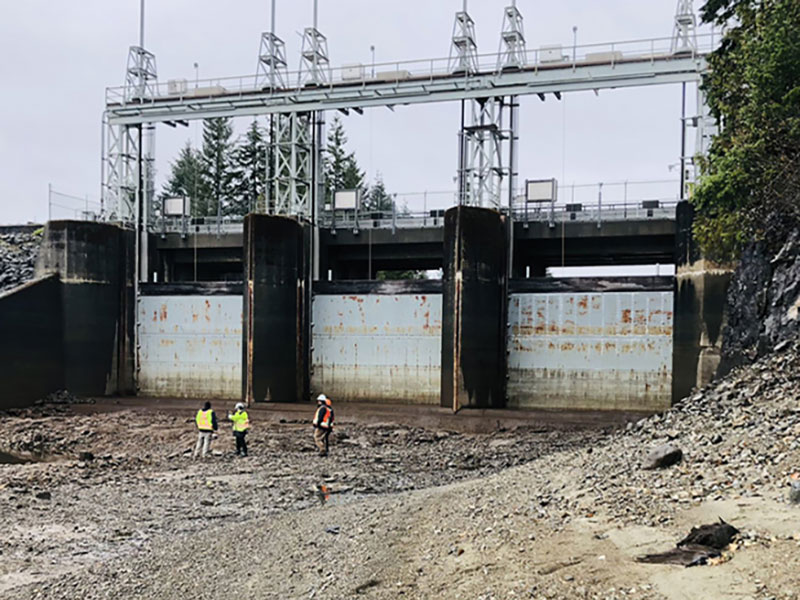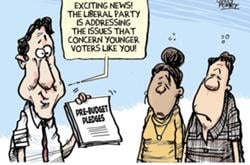British Columbia entered this month with the lowest snowpack in more than 50 years, creating risks for BC Hydro, agriculture and the coming fire season.
“The 63 per cent of normal for the province on April 1 is the lowest since 1970,” said Jonathan Boyd, a hydrologist with the province’s River Forecast Centre.
The April report usually captures the peak snowpack and is the primary one for comparing across years, though snow can keep accumulating into May, Boyd said. “It’s just a little bit too early to say with [certainty] that we will for sure have a major drought this year.”
The low precipitation is typical of the current El Niño pattern, where Pacific Ocean currents bring warmer than normal water to the West Coast. The pattern brings warmer winters and sometimes drier conditions, Boyd said.
The low snowpack would be a challenge for electricity producers in some areas of the province, he said. BC Hydro relies on melting snowpacks to fill reservoirs and allow power generation.
Speaking in early April, BC Hydro president and CEO Chris O’Riley said the utility has various tools it can use to get through a period of low water, including raising and lowering reservoir levels and importing power.
O’Riley was at the legislature to announce a call for new sources of power that will see BC Hydro acquire 3,000 gigawatt hours of electricity, about five per cent of the utility’s current supply and enough to power 270,000 homes. Proposed projects will need to be at least 25 per cent owned by First Nations.
At the announcement, Energy, Mines and Low Carbon Innovation Minister Josie Osborne said the drought has made it even clearer that the province has to diversify its electricity sources and bring more wind and solar power onto the grid.
“While some might deny that climate change is real and others want to rip up our climate plans, we know that B.C. will continue to see more extreme weather conditions in the years to come,” she said.
Asked by reporters about the effects of the drought on BC Hydro’s operations and customers, O’Riley said the utility is managing well despite the challenge.
“At this point in the year, we have our reservoirs back up to the typical normal levels that we would expect over, say, a 10-year average,” he said, adding that was a result of management decisions including importing more power than normal.
“We are facing a lower snowpack, as you've seen, and that will trigger imports in the coming year,” O’Riley said. “The exact amount is actually quite variable. We get a lot of surprising amount of inflow in the form of the spring rains and the summer rains in the north, so we'll see how that turns out.”
BC Hydro manages what it spends on imported power by spreading the cost out over time, he said. “That's been a successful technique that has helped us manage the impact so we're not hitting ratepayers with immediate sharp increases.”
Keeping rate increases lower than inflation has been a clear direction from the provincial government and BC Hydro is proud of achieving that in recent years, said O’Riley. “We will be able to maintain that in the coming years, including the effects of the drought.”
Other utilities may have less flexibility. When FortisBC, which provides electric service in parts of B.C.'s southern Interior, raised rates by 6.7 per cent in January, it cited a drop in hydroelectric generation among the reasons.
Minister of Water, Land and Resource Stewardship Nathan Cullen said in a statement that Wednesday’s update on the snowpack and the significantly higher risk of the drought continuing was concerning.
“Communities around B.C. experienced serious drought conditions last summer,” said Cullen. “It fuelled the worst wildfire season ever, harmed fish and wildlife, and affected farmers, ranchers, First Nations and industry.”
The province is taking action to help communities, farmers and industry prepare, he said, including by building more resilient water infrastructure and by providing money for watershed security and for improving agricultural water use.
Discussions are already underway with the oil and gas sector in the northeast of the province, which has remained in severe drought through the winter, about restricting water use, he said.
“We're hosting workshops in communities around the province to help farmers prepare for drought and to connect them with financial supports,” Cullen said. “We're convening regional tables in key drought-impacted areas so communities and water suppliers can use their local knowledge to develop local solutions.”
The government will take more steps as necessary, he said. "We are prepared for this, and we will all get through this together." ![]()
Read more: BC Politics, Environment

















Tyee Commenting Guidelines
Comments that violate guidelines risk being deleted, and violations may result in a temporary or permanent user ban. Maintain the spirit of good conversation to stay in the discussion and be patient with moderators. Comments are reviewed regularly but not in real time.
Do:
Do not: